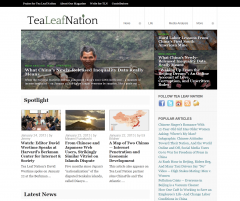Covering China through social media
 I just spent an hour watching David Wertime of Tea Leaf Nation talk about China and how to cover it through social media. The speach, “Redefining the Quote: Using the Social Web to Gauge Grassroots Sentiment in China”, was given recently at the Berkman Center for Internet & Society at Harvard. You can watch the whole thing here.
I just spent an hour watching David Wertime of Tea Leaf Nation talk about China and how to cover it through social media. The speach, “Redefining the Quote: Using the Social Web to Gauge Grassroots Sentiment in China”, was given recently at the Berkman Center for Internet & Society at Harvard. You can watch the whole thing here.
It’s well worth watching. In an introduction Wertime talks about Weibo (the Chinese equivalent of Twitter which has more than 400 million registered accounts) and how it functions both as a place for debate but also can have the effect of letting off steam and actually halt a movement towards democracy, as famous blogger Michael Anti has suggested.
Wertime says:
It’s the closest thing to a free speach platform for debate about the issues of the day in China. It’s a platform for breaking news and stories. It provides a window into Chinese attitudes and Chinese life.I think you can argue that it’s a steam valve for discontent. Some people have said that because of the number of users who go onto weibo.com to complain about their government or their lives, in fact it causes people to speak rather than to do, and actually acts as a curb on collective action.
Tea Leaf Nation, Wertime says, seeks to synthesize China’s online chatter into English language stories.
The company was founded in December 2011. The contributors are volunteers, often overseas Chinese who know the language well and also can explain the grassroot sentiments that the Weibo discussions convey to a western audience.
It must be hard work getting a feel for what the average Chinese person thinks about different issues, considering censorship and also authenticity while facing the many government-employed commentators, the wumáo or 50 Cent Party, there seems to be out there. (If you haven’t read Ai Weiwei’s interview with one of them in the New Statesman last October you’ve missed out on something: China’s Paid Trolls: Meet the 50-Cent Party)
Other issues to consider is the representativeness of the comments – is it possible to generalize from the words of the Weibo users – and also, with so many quotes to choose from, the risk of journalists picking what confirms their beliefs.
There is also a risk that the journalist mistakenly assumes somone to be of the 50 Cent Party just because they express opinions that the journalist hopes that everyday citizens don’t have. “Am i over-correcting because I don’t want this comment to be a true reflection?,” Wertime muses. One way to differentiate between the two is to look at the Weibo account. “The level of care and love that they have put into their account gives you a sense of whether it’s just been thrown up there very quickly. But there’s no way to be sure. It’s a minefield and that’s just one of the bigger mines.”
Never the less, Wertime is optimistic and points out a number of things that speaks for Chinese social media as a source for information and sentiments from China, as opposed to the government-controlled mainstream media.
These include:
- Candor/spontaneity
- numerosity
- transparency (Tea Leaf Nation they link to the handles of everybody they quote)
- it’s better than the alternative
Further on in the Berkman session Wertime talks about the need for best practices, the Chinese government’s laws that might force realname registration, and how you can tell if a local official has lost the central government’s support, among other things.
Tea Leaf Nation also has a Facebook page.





1 Response
[…] Holmström is a journalist with a mix of personal and professional writings. The post Covering China through social media has some great takeaways on how culture is such a ground-defining factor on all communication, […]